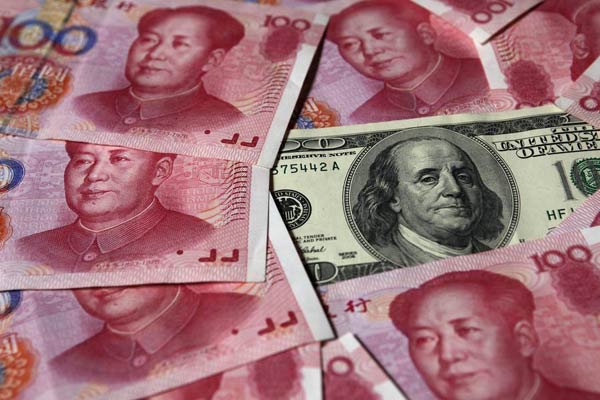Yuan hit by turmoil in the market
By CHEN JIA (China Daily) Updated: 2015-07-09 08:31
|
 |
|
A $100 banknote is placed next to 100 yuan banknotes in this October 16, 2010 file picture illustration taken in Beijing. [Photo/Agencies] |
But share dip unlikely to have major effect on real economy or financial system, say experts
Ripple effects from the stock market plunge have put the yuan under pressure and prompted the government to introduce more measures to restore stock exchange stability.
However, the sharp decline in share prices should have a limited impact on the overall financial system and the real economy, according to experts.
The offshore-traded yuan declined for three consecutive trading days to 6.2279 yuan per US dollar on Tuesday, the lowest level since April 13.
In the forward exchange market, the currency suffered its biggest daily fall in four months as foreign funds pulled money out of Chinese mainland stocks on signs that the central government may not be able to stem the market rout.
Meanwhile, the uncertainty over whether Greece will leave the eurozone will continue to strengthen the US dollar in the short term, putting more depreciation pressure on the yuan.
Investors bet on a drop to 6.4064 yuan per US dollar in a year's time, a 3 percent depreciation from the current value. This indicated concern over further financial risks arising from the stock market turmoil.
Thierry Wizman, a researcher at Macquarie Group, said foreign exchange traders are short-selling the offshore yuan when A-shares suffer heavy losses.
The benchmark Shanghai Stock Composite Index retreated to a three-month low of 3,507.19, a 5.9 percent drop on the day, at the close of trading on Wednesday, while the Shenzhen Component Index closed at 11,040.89, down 2.9 percent. The CSI 300 Index, which tracks shares in the largest companies listed in Shanghai and Shenzhen, fell 6.8 percent.
Nearly 1,000 stocks fell by the 10 percent daily limit. Almost half the companies listed on the two exchanges have suspended trading in their shares.
Hong Kong's Hang Seng Index dived to 23,516.56, a 5.84 percent fall, the largest daily drop in seven years.
"Stock declines (in recent weeks) should have a relatively limited impact on general household wealth, as equities account for only about 12 percent," said Wang Tao, UBS's chief economist in China.
"The effect on the real economy is also limited. We maintain our 6.8 percent GDP growth forecast for this year, though we do see stock market volatility bringing downside risk at the margin."
The People's Bank of China, the central bank, announced on Wednesday that it will provide sufficient liquidity for the stock market by injecting capital into China Securities Finance Corp, a State-owned company that provides margin financing loan services to qualified securities companies.
- 2015 China International Fair for Investment and Trade kicks off in Xiamen
- China's commodity imports robust in Jan-Aug period
- China stocks rebound 2.92%
- 2015 China box office already past 2014 total
- China foreign trade decline widens in August
- Interview: JP Morgan's senior executive bullish on China
- Innovation, development the focus for NZ mayors
- Lives of freelancers

















